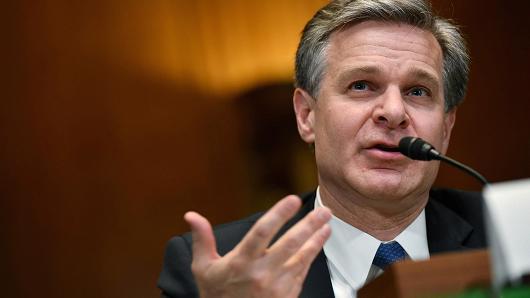
Mandel Ngan | AFP | Getty Images
FBI Director Christopher Wray testifies before the Senate Appropriations Committee on the proposed budget for FY2019 for the FBI in the Dirksen Senate Office Building on Capitol Hill in Washington, DC on May 16, 2018.
The FBI reportedly overstated encryption threat figures to both Congress and the public due to a programming error, according to The Washington Post.
The bureau claimed that investigators were locked out of about 7,800 mobile devices connected to criminal investigations. The more accurate number, however, is likely between 1,000 to 2,000 devices, the Post reported.
FBI Director Christopher Wray used the inflated statistics for about seven months to make a compelling argument for the need to defend against “Going Dark,” or the use of encrypted software to prevent investigators from accessing digital data even with a court order. Attorney General Jeff Sessions also cited the figures in March, saying “each of those devices was tied to a threat to the American people.”
The FBI told the Post the incorrect numbers were due to an internal accounting system that used three separate databases, which lead to the repeated counting of mobile devices. The bureau first became aware of the miscount a month ago and still does not have an accurate number of encrypted phones tied to investigations in 2017.
Though the encryption statistics were incorrect, the FBI told the Post that “Going Dark remains a serious problem for the FBI.”
The encryption and data privacy debate became prominent after the FBI asked Apple to unlock the iPhone belonging to Syed Farook, the shooter who killed 14 people in San Bernardino, Calif. in 2015. Apple refused to do so — CEO Tim Cook said unlocking Farook’s phone would require writing a new software that would be a “master key, capable of opening hundreds of millions of locks.”
The FBI did not immediately respond to CNBC’s request for comment.
Read The Washington Post’s full report here.
 EU News Digest Latest News & Updates
EU News Digest Latest News & Updates



